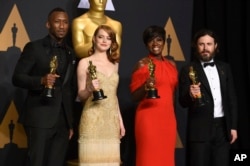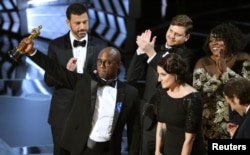This is What’s Trending Today.
“There’s a mistake. ‘Moonlight,’ you guys won best picture.”
And with those words, producer Jordan Horowitz of “La La Land,” told the cast and crew of a competing film that it had won the Oscars’ biggest award.
Presenters Warren Beatty and Faye Dunaway were given the wrong category’s envelope before they went on stage.
They may have been given the back-up envelope for the “best actress” award, which earlier was given to Emma Stone of “La La Land.”
Beatty was clearly confused about what he saw when he opened the envelope, but Dunaway read the name of the film listed below Stone’s name.
The actors and producers from “La La Land” left their seats and filled the stage to accept their Oscar statues.
They gave many speeches before Horowitz interrupted.
“This is not a joke. Moonlight has won best picture,” he said.
He took the card from Beatty and held it up for the cameras. “Moonlight. Best Picture,” he said as the camera moved closer.
The show’s host, comedian and late-night television host Jimmy Kimmel, made the best of the situation. He went up to Beatty, and exclaimed “Warren. What did you do?”
Kimmel also said, “personally, I blame Steve Harvey.”
That was in reference to the mistake Harvey made in 2015 at the Miss Universe pageant.
He announced the wrong winner, first saying it was the contestant from Colombia, and then realizing the correct winner was actually from the Philippines.
Once order had been restored, Beatty tried to explain what happened, saying he had been given the wrong envelope.
Barry Jenkins is the writer and director of “Moonlight.”
Once he reached the stage, he said “even in my dreams, this cannot be true.”
Stone, happy to have won the best actress award, later said “is that the craziest Oscar moment of all time? Cool!”
Many people are wondering how the mistake was made. The accounting firm PricewaterhouseCoopers has been handling Oscar votes for over 80 years without any problems.
The firm apologized to all of the people who were made uncomfortable by the mistake. It promised to investigate what caused the error.
Horowitz is being credited for staying calm and stopping the show to correct the error.
People are calling him “gracious,” “a great producer,” and “classy.”
Even Jenkins said “much respect to that dude.”
A story from USA Today detailed the backstage moments of the show. The newspaper said people could be heard shouting “Best show ever!” at the end of the night.
The other major award winners will always remember their victorious night because of the best picture mix-up.
They included: Viola Davis and Mahershala Ali for their supporting roles in “Fences” and “Moonlight;” “Manchester by the Sea,” for best original screenplay and “Moonlight” for best adapted screenplay; Casey Affleck for best actor and Damien Chazelle for best director. “The Salesman,” a film from Iran, won the award for best foreign film.
Director Asghar Farhadi did not attend the ceremony. He wrote a letter that said he chose not to attend in protest of President Donald Trump’s attempts to ban immigrants to the United States from a number of majority Muslim countries, including Iran.
And that’s What’s Trending Today.
I’m Dan Friedell.
Dan Friedell wrote this story for Learning English based on reporting by the Associated Press. Hai Do was the editor.
What did you think of the Oscars? Let us know in the comments section.
_______________________________________________________________
Words in This Story
back-up – n. a person or thing that can be used to replace or support another person or thing
confused – adj. unable to understand or think clearly
pageant – n. a beauty contest, in which people judge a group of women or girls and decide which one is the most beautiful
restore – v. to give back or return something
cool – adj. often used to show approval in a general way
firm – n. a business organization
gracious – adj. very polite in a way that shows respect
classy – adj. showing impressive character : very good, kind, etc.
dude – n. a man — used especially by young people
adapt – v. to change (a movie, book, play, etc.) so that it can be presented in another form










